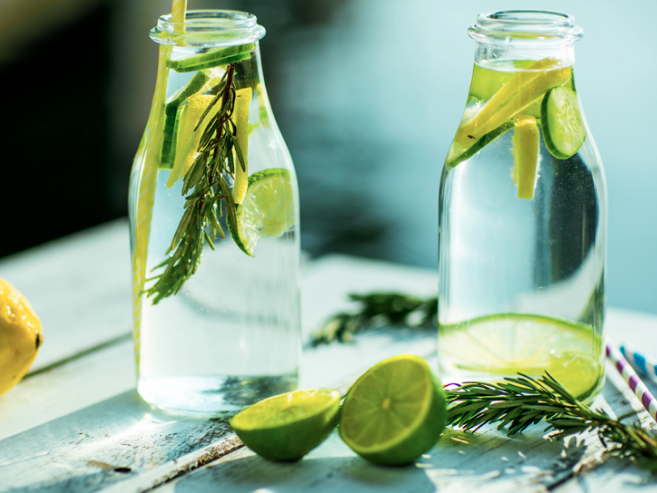VIDEO Transcript:
Hi guys, this is Kiran Krishnan, research microbiologist and your favorite neighborhood scientific nerd, here with some more information for you. I get a lot of questions on detox systems, including cleanses, detoxes, and people who do frequent colon hydrotherapy. And people always ask me “Are these the right things to do?” Or, “What should we do for a detox system?”
It's important to note that your body is actually quite good at detoxing itself. There are many systems in your body that are designed to get rid of toxins and food particles and even your own damaged cells, so that you don't harbor those things and they don't end up causing problems. Your body's already designed well to get rid of things, you just have to put it in the right condition.
Now, there are a lot of cleanses out there and a lot of people are doing many different things. They might spend three days just drinking apple cider vinegar. They might spend two and-a-half days just doing water and cayenne pepper. In my experience, and looking at the scientific literature you don't really need to do any of those really extreme things.
The best thing you can do to actually detoxify your body is stop putting stuff in it.
When your body doesn't have things coming in that it has to process all the time, it'll go into this phase called autophagia. Another subset of that phase is called mitophagia. What autophagia means is that your body goes into this mode where it starts cleansing itself, including getting rid of your own damaged cells, damaged DNA, damaged mitochondria, damaged cells, damaged protein. All these things are removed, because your body has something called autophagosomes. Think of these as cleanup cells that go around and just remove things that shouldn't be there out of your system.
But your body can't do that if you're constantly eating and taking things into your system that your liver has to actually process.
Fasting
The best thing to do is go through a period of fasting, and you don't have to do it much. You can either do what I do, which I do a daily 16-hour fast, and I eat and drink everything I'm going to eat and drink, aside from water, in an eight-hour window. And the other 16 hours I'm not taking in anything caloric or anything that my liver has to process. Every once in a while, if I have a particular bad few "eating" days, like Thanksgiving week, I'll do a 24-hour fast, where I give my body that chance to clean up and get rid of things. Your gut is an amazing tool that can clean up.
Your gut microbiome is great at processing and metabolizing toxins and things that shouldn't be in your system, and getting rid of it through defecation. Your kidneys, your liver, your pancreas, all of these things are designed to clean out your system and get rid of it, but again, it can only do that when you're not constantly putting stuff into your system.
If you're looking to detox, the most natural, healthy way to detox is to fast to some degree. It could be a 16-hour daily fast for a week, or it could be throwing in a 24-hour fast in there somewhere, but you really don't have to do it for much longer than that. I'm not saying go out and do a seven-day fast or do a four-day fast. And then, of course, if you're diabetic and you have sugar problems, talk to your doctor about it. Figure out a good way to manage the blood sugar issues if you're looking at doing a fasting.
Colon Hydrotherapy
Then the other part of it is the colon hydrotherapy. When you do shove water up your colon, it's going to fluff off a lot of bacteria. It's going to get rid of bacteria that are in the mucosal layer. It will bring down the microbial load. With some people that have really dysfunctional bacteria, that could be a good thing, assuming that you're also taking in prebiotics and probiotics, especially spore-based probiotics or precision prebiotics that increase the diversity in your microbiome so that - as you're washing things out - you're allowing new things to start growing and reestablishing itself.
I wouldn't do a colon hydrotherapy without taking the right prebiotic/probiotic, because if you wash a lot of the good bacteria out, even if you're doing both good and bad bacteria, you're leaving too much room in there for other unfavorable things to take hold. Maybe it could be yeast or fungus, so you want to be careful of doing that without taking the right pre and probiotic.
I also wouldn't do a colon hydrotherapy more than once every couple of weeks. It's not something that we should be doing on a regular basis. It's not something that we should be making the practice of shooting water in our colon, which has the ability to slough off bacteria from your mucosa.
Retention Enema
The retention enema is a little bit differently. I know a lot of people that do retention enemas quite frequently and see a lot of benefit from it. That's a smaller amount of water. It's not going in with force, and you're actually holding it into your system for some time. That's a little bit different. That you can do more frequently, but again, with all of those, you want to make sure you have the right prebiotic and probiotic, because anytime you're removing bacteria it leaves room for unfavorable things to take hold and grow. So you want to make sure, as you're removing things, you're putting in things that can ensure a healthy, diverse microbiome will reestablish itself.










